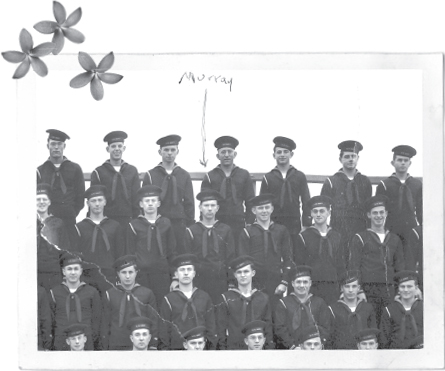

Well, we lost some more of the gang yesterday…Took us off alphabetically to the Mc’s and so that cut us in two again.—January 9, 1945

My life was full of the joys of parenting: sleepovers, football games, school dances, driver’s ed, family camping trips, and on and on. And in between, at least on our appointed day of Wednesday, I met with my father. Each Wednesday was a reminder that even with all the progress we’d made, we still had a long way to go. And no matter how each day went, we always found ourselves ready to try again the next week.
Dad continued to feed me little bits of information. But there was nothing sequential about his memories. I likened it to taking the pages of a book and cutting them into sentences or paragraphs and then randomly giving you a passage here and there, with no assurance that you would ever get the whole book. And my job was to organize the pieces so that I could plug them in later, when—if—I ever knew the whole story.
I was learning when to push and when to back off. It was a delicate balance, and one that often, because of my own impatience, got off kilter.
Sometimes he didn’t want to talk and I simply didn’t have a new question to ask. But as long as we kept meeting once a week, we were both happy.
Still, I often imagined his story up until the abrupt halt in information he’d shared with me. In my mind’s eye, it was like watching a television show. I saw a young man from a small farming community being trained to break a top-secret code. He then sat and waited as the war seemed to pass him by. After a few more scenes and a few commercial breaks, the action picked up again. Things were moving much more quickly now. I saw him climbing from a rubber raft up a steep ladder to board a Navy ship in the middle of the ocean. But then the story stopped. The power went off.
My thoughts were divided: I knew that talking about what is troubling you is good. So I wanted that for my father. But I didn’t know where his breaking point was. And there wasn’t any manual for that.
All the while, life around me just kept moving forward. The kids still needed braces in the fall. Football practice was about to start. And homework had to be done every night.
At our weekly breakfasts though, for an hour or two I could focus on just one thing: my dad. And regardless of the subject, regardless of whether we were talking about his story or not, it was, for me, a break from being torn in different directions. I’d learned to be content with silence. I busied myself with moving forward reading his letters and transcribing them. When the time was right, either he would start talking again or I would ask questions again. I was beginning to believe in my intuitive sense for timing.

After breakfast one morning, my dad and I ran a few errands. We went through the drive-through to refill my prescription and then to the home improvement store. My father was like a kid in a candy store at Home Depot. He’d wander up and down the aisles looking for some new gadget or a specific piece of something for his latest project at home. We went our separate ways at the door, me to the gardening section and him to everything else.
He was quiet on the way home—worn out, I supposed. As I turned the corner to his street, he asked if I’d mind coming in. He had something for me to read.
“It’s in here,” he said, leading me to the sunroom.
I felt a sense of déjà vu. It had been a long time since he’d placed the notebooks full of letters on my lap, and in that very same room.
I moved a needlepoint pillow as I sat on the corner sofa. He handed me a book. It was Tom Brokaw’s The Greatest Generation Speaks. Then he reached down, opening it to a page marked by a yellow sticky note.
“The first paragraph,” he said.
He walked across the room and sat on an antique chair.
I looked down at the book. The text was set apart, a quote.
“Don’t read it out loud,” he said. “I can’t…”
He didn’t finish his sentence. I began reading.
Most of those who survived know it was simply fate that saved them. Their buddies a few feet to the left and to the right were fatally wounded. The survivors carry that with them to this day; they are still asking, “Why did I survive?” Every day and every opportunity is a dividend their fallen comrades never realized. One man wrote to me about his father, a World War II combat veteran who had lost many young friends in battle. Recalling those who didn’t live beyond their twenties, the dying man said to his son, “Don’t sing any sad songs for me, boy. I’ve had my life. I’ve seen my grandchildren. Don’t sing any sad songs for me.”
I stared at the page, absorbing the words. When I looked up, my father’s eyes were on me, as if he’d been watching me as I read.
“This is how you feel?” I asked.
He nodded, ever so slightly.
That short paragraph gave words to my father’s silent ache. But it also was a new beginning for us. It was clear that although my father had not been talking with me about the war, his thoughts had remained on it, just as mine had. Neither of us had truly taken a break from it. In fact, I presumed that it was now impossible to take a break from it. It was like a carnival ride that had already begun and it was too late to change your mind. There was only one thing to be done now, and that was to finish what we’d started.
“Do you mind if I take this home with me?” I asked. “I just want to make a copy of it.”
“Sure,” he said. “You can keep it. I’m done with it.”